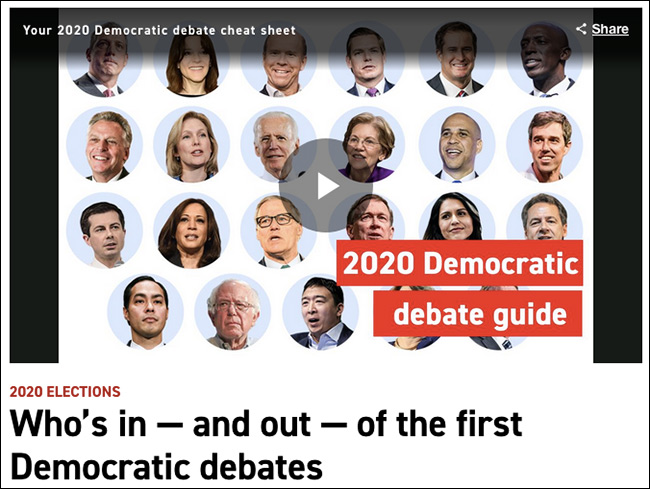By Jim Ellis
June 10, 2019 — The Politico publication ran a story late last week detailing building friction between the Democratic National Committee and Montana Gov. Steve Bullock, a late-entering Democratic presidential candidate, over the committee leaders apparently axing the western governor from the first debate forum coming later this month.
The source of controversy is the party leadership contending that Gov. Bullock, who looked to have qualified for the debate under the outlined criteria, now has not. Instead, New York City Mayor Bill de Blasio is in position to capture the 20th and final debate podium for the upcoming June 26-27 candidate forums from Miami.
As we have previously reported, the qualifications the party leaders have placed upon the candidates require them to either build a fundraising organization of 65,000 donors, with a minimum of 200 coming from 20 states, or score one percent support in at least three surveys from eight designated pollsters.
Gov. Bullock appeared to have met the polling requirement. He exceeded the one percent threshold in the ABC/Washington Post survey in January. But, the DNC is now disallowing this particular poll, and the action probably eliminates him from the debate.
Their reasoning is that the ABC/Post poll asked an open-ended presidential ballot test question — that is, where the names of the candidates are not read, but the respondents must voluntarily state a name. This type of question is usually employed to test hard name identification and candidate strength.
A poll they do recognize, however — and this one gets de Blasio into the debate — is an Ipsos/Reuters online survey that questioned both adults and registered voters. Even though de Blasio only made the one percent threshold under the adult question and not among the registered voters’ segment, the party leaders are recognizing that result and placing him ahead of Gov. Bullock.
The Politico writers correctly point out that Bullock’s position appears to be correct. The governor’s campaign spokespeople, who point out that he is the only Democratic presidential candidate to win a state that President Trump carried, contends that the party leaders changed the rules after they were announced and are discarding a stronger poll and replacing it with weaker data. The decision eliminates a small-state western governor and rewards the big city east coast mayor. It appears the DNC is simply playing to its political base, but the move is a curious one and looks to be unfair.
Furthermore, the DNC leaders have said they will not use the online Ipsos/Reuter’s data in future debates, choosing to go with the live interview surveys, thus giving further support that the I/R adult sample results are not as accurate as the other sanctioned surveys.
The final debate decisions will be made on June 12, but 13 candidates have clinched positions because they have both exceeded the polling and fundraising requirements. Nine, at this point, are the top polling candidates (averaging more than two percent) and five of these will be randomly placed on the first debate night, with the remaining four on the second.
They are: former Vice President Joe Biden, Sens. Bernie Sanders (I-VT), Elizabeth Warren (D-MA), Kamala Harris (D-CA), Cory Booker (D-NJ), Amy Klobuchar (D-MN), Mayor Pete Buttigieg, ex-Rep. Beto O’Rourke (D-TX), and former HUD Secretary Julian Castro.
The other four sure qualifiers are: Rep. Tulsi Gabbard (D-HI), Gov. Jay Inslee (WA), author Marianne Williamson, and New York City entrepreneur Andrew Yang.
With seven slots remaining, because the DNC is limiting the debate to 20 candidates, the final qualifiers look to be: Sen. Michael Bennet (D-CO), Mayor Bill de Blasio, Ex-Rep. John Delaney (D-MD), Sen. Kirsten Gillibrand (D-NY), ex-Gov. John Hickenlooper (CO), and Reps. Tim Ryan (D-OH) and Eric Swalwell (D-CA).
This means Gov. Bullock, Rep. Seth Moulton (D-MA), Miramar Mayor Wayne Messam, and former Sen. Mike Gravel (D-AK) will be left on the sidelines. While time still remains until Wednesday’s deadline, it is unlikely that any of these four will make the cut because the tie-breaker is polling average.
Once the debate participants are finalized, the DNC personnel will then choose half of the highest-polling group, those who average over two percent, and randomly select them for the first night. Then half of the lowest-polling group will also be chosen for the first night, with the rest being placed on the June 27 forum.

